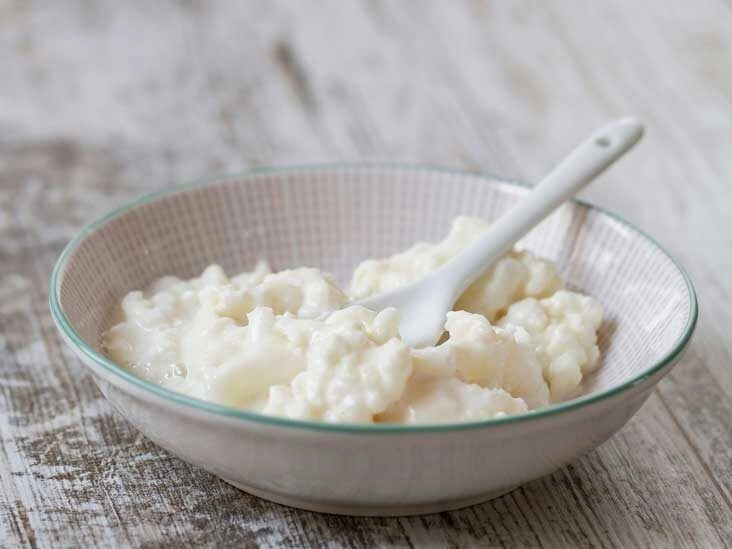This well-loved fermented milk beverage is frequently praised for its health-promoting qualities. Kefir is nutrient-dense, rich in probiotics, and easy on the digestive system. Below is the research that supports these claims.
Kefir, a common food in numerous cultures worldwide, has gained notable popularity within the natural health community.

Packed with vitamins, minerals, and beneficial microbes, it supports digestion and gut wellbeing. Many people even regard it as more nutritious than yogurt.
Here are nine research-supported health advantages of kefir.
1. Kefir provides an excellent array of nutrients
Kefir has its roots in parts of Eastern Europe and Southwest Asia. The word comes from the Turkish term “keyif,” which describes the pleasant feeling after eating.
This fermented beverage is traditionally produced from cow’s or goat’s milk.
It’s created by adding kefir grains to milk. These aren’t cereal grains but rather grain-like clusters of yeast and lactic acid bacteria that look somewhat like cauliflower.
Over roughly 24 hours, the microbes in the kefir grains multiply and ferment the milk’s sugars, producing kefir. The grains are then strained out and can be reused.
In short, kefir refers to the beverage, while kefir grains are the starter culture used to create it.
The grains’ lactic acid bacteria convert the milk’s lactose into lactic acid. This process gives kefir its tart flavor similar to yogurt — though kefir is thinner in texture.
A serving of low-fat kefir contains:
- Protein: 9 grams
- Calcium: 36% of the daily value (DV) for adults
- Phosphorus: 20% of the DV
- Vitamin B12: 29% of the DV
- Riboflavin (B2): 25% of the DV
- Magnesium: 7% of the DV
- Vitamin D: 12% of the DV
Additionally, kefir typically contains about 104 calories, 11.6 grams of carbohydrates, and 2–3 grams of fat, depending on the milk used.
Kefir also includes various bioactive substances, such as organic acids and peptides, which contribute to its health effects.
Dairy-free kefir alternatives can be made using coconut water, coconut milk, or other sweet liquids, but these versions won’t match the nutrient profile of dairy-based kefir.
2. Kefir is a stronger probiotic source than yogurt
Certain microbes can provide health benefits when consumed.
Called probiotics, these organisms can affect health in multiple ways, helping digestion, weight control, and mental wellness.
While yogurt is the best-known probiotic food in Western diets, kefir actually offers a much richer probiotic profile.
Kefir grains may contain as many as 61 strains of bacteria and yeasts, making them an exceptionally diverse probiotic source, though strain diversity can vary.
Other fermented dairy items typically contain far fewer strains and generally lack yeasts.
3. Kefir exhibits strong antibacterial effects
Certain probiotic strains in kefir are thought to help defend against infections.
This includes the kefir-unique probiotic Lactobacillus kefiri.
Research shows that this strain can suppress the growth of several harmful bacteria, including Salmonella, Helicobacter pylori, and E. coli.
Kefiran, a polysaccharide found in kefir, also displays antibacterial activity.
4. Kefir may boost bone health and reduce osteoporosis risk
Osteoporosis involves the weakening of bone tissue and is a significant issue in many Western countries. It is particularly prevalent among older women and greatly increases fracture risk.
Ensuring sufficient calcium intake is one of the most effective strategies to support bone health and slow osteoporosis progression.
Full-fat kefir not only supplies calcium but also vitamin K2 — a nutrient important for calcium utilization.
Animal research links kefir consumption to increased calcium uptake in bone cells, resulting in improved bone density and potentially fewer fractures.
5. Kefir may offer cancer-protective effects
Cancer is a leading cause of death worldwide and occurs when abnormal cells grow unchecked, for example forming tumors.
Probiotics in fermented dairy products can stimulate the immune system and may help reduce tumor growth, indicating that kefir could have anticancer properties.
Such protective effects have been observed in in vitro studies.
One study reported that kefir extract decreased the number of human breast cancer cells by 56%, compared with a 14% reduction from yogurt extract.
However, human clinical trials are needed before definitive claims can be made.
6. Kefir’s probiotics may ease various digestive issues
Probiotics like those in kefir can help rebalance beneficial gut bacteria.
That’s why they are effective for treating several kinds of diarrhea.
Moreover, substantial evidence indicates that probiotics and probiotic foods can relieve many digestive complaints.
These include irritable bowel syndrome, ulcers linked to H. pylori infection, and other conditions.
For these reasons, kefir can be helpful if you experience digestive problems. Learn more about how fermented dairy compares to other probiotic foods in our kefir vs yogurt guide.
7. Kefir is low in lactose
Dairy products naturally contain a sugar called lactose.
Many adults, in particular, cannot properly digest lactose — a condition called lactose intolerance.
The lactic acid bacteria in fermented dairy foods like kefir and yogurt convert lactose into lactic acid, making these foods much lower in lactose than milk.
They also include enzymes that further help break down lactose.
Consequently, kefir is generally better tolerated by people with lactose intolerance than plain milk.
It’s also possible to prepare kefir that is entirely lactose-free by using coconut water, fruit juice, or other non-dairy liquids.
8. Kefir may reduce allergy and asthma symptoms
Allergic reactions result from inflammatory immune responses to particular foods or substances.
Individuals with an overreactive immune system are more susceptible to allergies, which can trigger conditions such as asthma.
In animal experiments, kefir has been shown to dampen inflammatory responses associated with allergies and asthma.
Human studies are required to further clarify these potential benefits.
9. Kefir is simple to prepare at home
If you’re concerned about the quality of store-bought kefir, you can make it yourself with ease.
Paired with fresh fruit, kefir makes a nutritious and tasty dessert.
Kefir grains are sold in some health food shops and supermarkets, as well as online. Note that grains for dairy versus nondairy kefir are different.
There are many online guides and videos showing how to make kefir, but the method is straightforward:
- Place 1–2 tablespoons (14–28 grams) of kefir grains into a small jar. Using more grains will speed up fermentation.
- Pour in about 2 cups (500 ml) of milk, preferably organic. Milk from grass-fed cows has higher beta-carotene and vitamin A. Leave about 1 inch (2.5 cm) of space at the top of the jar.
- For a thicker texture, you can add some full-fat cream.
- Seal the jar and let it sit at room temperature for 12–36 hours. That’s all there is to it.
When the mixture becomes slightly lumpy, it’s ready. Strain out the liquid gently to recover the kefir grains. Place the grains in a new jar with milk and begin the process again.
It’s flavorful, nourishing, and environmentally sustainable.
The bottom line
Kefir is a wholesome fermented food with a consistency similar to drinkable yogurt.
Although traditionally made from dairy milk, numerous non-dairy alternatives exist.
Research indicates it may support immune function, aid digestive issues, enhance bone health, and potentially help fight cancer.
Try incorporating kefir into your diet to enjoy this tangy, nutritious beverage.

























Leave a Reply
You must be logged in to post a comment.